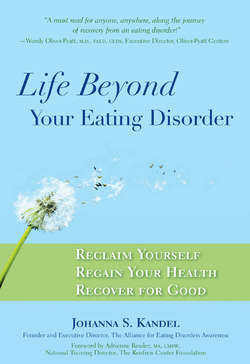Читать книгу Life Beyond Your Eating Disorder - Johanna Kandel - Страница 7
Foreword
ОглавлениеJOHANNA KANDEL BEGINS THE PREFACE of this wonderful book with a disclaimer, saying what she is not—not a psychiatrist, therapist, nutritionist or doctor of any kind. She does say that she is a recovered individual who knows the physical and emotional journey of those who struggle with an eating disorder. But, oh, Johanna is so much more than that, as those of you reading this will certainly realize by the last chapter. She is a visionary, an activist, a healer, a teacher, an organizer, a warrior, a negotiator, a mediator, an author and an optimist. She is an inspiration to all whose lives she has touched, but never has she wanted to be a role model to be admired, copied or looked up to. This book provides many tales of recovery to help readers understand that there are many paths to healing, each as unique as the traveler herself. The message reinforced here is that there is no room for competition or perfection in recovery—no glory in being the fastest, the best, the thinnest or the most popular. Recovery is a process and the right process is the one that works best for you.
I have been involved in the field of eating disorders for almost thirty years, specifically in the area of body-image treatment and training. I met Johanna when she was nineteen years old and a volunteer working at the International Association of Eating Disorders Professionals (IAEDP) Conference. Just as Johanna has changed and grown since that time, so has the field of eating disorders itself. We now know more than we ever did before about the complexity of eating disorders: their connection to other psychiatric disorders, the gender-biased risk factors, the role of the brain, genetics and one’s temperament as variables, the connection between body shame and the culture, and the importance and effectiveness of complementary treatment modalities such as art therapy, dance/movement therapy, spirituality and yoga. Research has given us more information and more tools. We need to always keep the belief alive that recovery is possible, that no recovery is “perfect” and no one should ever give up. It may be useful to know that the word recover comes from the Latin and means “to bring back to normal position or condition.” Therefore, the person we discover during recovery is not someone new, but someone we have once been, a person whole and integrated. Recovery needs to be viewed as a continuous process that allows for the development of a greater sense of oneself, not a definite end of symptoms.
Years ago I came across the following passage in the book On Death and Dying by Elisabeth Kübler-Ross. I share it here because I associate it so closely with the struggle involved in freeing oneself from the grasp of the eating disorder:
It is not the end of the physical body that should worry us. Rather, our concern must be to live while we’re alive—to release our inner selves from the spiritual death that comes with living behind a façade designed to conform to external definitions of who and what we are.
Like a vampire who takes the very lifeblood from the innocents who fall under his spell, so, too, the eating disorder takes the very life spirit of those who relentlessly pursue the seductive belief that their true selves do not measure up to societal expectations and substitute a “perfect” self in order to be acceptable. Recovery involves a reclaiming of one’s true self, giving up the eating disorder identity, making peace with one’s body, shifting away from negative self-talk, relinquishing a victim mentality and staying optimistic despite setbacks and difficult times. As Dan Millman, author of Way of the Peaceful Warrior, said, “You don’t have to control your thoughts; you just have to stop letting them control you.”
Life Beyond Your Eating Disorder is a true recovery guide for individuals at any stage of eating disorder treatment or recovery. It is also excellent for families and friends to better understand how to provide support while maintaining their own lives. The book provides a candid, comprehensive look at the ups and downs of recovery and offers tips, resources, hands-on tools and strategies for breaking free from the distortions and beliefs that make up the world of the eating-disordered individual. The book is exceptional, as is its author.
Adrienne Ressler, MA, LMSW
National Training Director for the Renfrew Center Foundation
President, International Association of Eating Disorders Professionals (IAEDP)
